|
|
|
Sort Order |
|
|
|
Items / Page
|
|
|
|
|
|
|
| Srl | Item |
| 1 |
ID:
044472
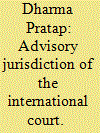

|
|
|
|
|
| Publication |
Oxford, Oxford University Press, 1972.
|
| Description |
xvi, 292p.
|
| Standard Number |
0198253028
|
|
|
|
|
|
|
|
|
|
|
|
Copies: C:1/I:0,R:0,Q:0
Circulation
| Accession# | Call# | Current Location | Status | Policy | Location |
| 011127 | 341.552/DHA 011127 | Main | On Shelf | General | |
|
|
|
|
| 2 |
ID:
193484
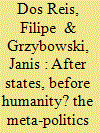

|
|
|
|
|
| Summary/Abstract |
In the debate on the (de-)judicialisation of international affairs and the International Criminal Court (ICC) specifically, the distinctions between legality and politics and between state sovereignty and the international remain contested. While realist and legalist approaches discuss the transformation of international politics by international criminal law, sociological and critical-legal perspectives instead highlight the politics of international criminal law. In this contribution, we focus on how the distinctions between (international) law and politics matter, not as substantively opposed spheres, but as boundaries that the ICC itself contingently and flexibly draws when considering particular situations. These meta-politics of invoking and reproducing key boundaries in seemingly technical elaborations of the interest of justice, the scope of its jurisdiction, or the application of complementarity reflect the Court’s particular authority but also its predicament of pushing for an international criminal law serving humanity, rather than states, while reproducing the distinctions between (international) law and politics. We illustrate the Court’s meta-politics by revisiting three recent decisions of the ICC to (not) investigate alleged international crimes committed by British forces in Iraq, by the Taliban, governmental, and US forces in Afghanistan, and by Israeli authorities and Palestinian groups in the West Bank, East Jerusalem, and Gaza.
|
|
|
|
|
|
|
|
|
|
|
|
|
|
|
|
| 3 |
ID:
080890
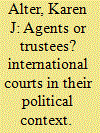

|
|
|
|
|
| Publication |
2008.
|
| Summary/Abstract |
In International Relations applications, theorists employing Principal- Agent (P-A) theory have posited that the fact of delegation defines a relationship between states (collective Principals) and international organizations (Agents) where recontracting threats are the predominant way states influence IOs. Developing a category of delegation to international Trustees, I argue that recontracting tools will be both harder to use and less effective at influencing the Trustees. Trustees are (1) selected because of their personal reputation or professional norms, (2) given independent authority to make decisions according to their best judgment or professional criteria, and (3) empowered to act on behalf of a beneficiary. These three factors account for the different politics between Principals and Trustees, a politics aimed at either keeping issues outside of the domain of the Trustee or at rhetorically engaging the Trustee's authority in an effort to persuade the common `beneficiary' whose loyalty and respect both States and the Trustee seek. In explaining why recontracting threats are not central to Principal-Trustee relations, the analysis bounds the realm in which we might expect P-A theory to apply, and provides a theoretical basis to question the `rational expectations' claim that ICs are tailoring their decisions to reflect the wishes of powerful states and avoid adverse recontracting
|
|
|
|
|
|
|
|
|
|
|
|
|
|
|
|
| 4 |
ID:
172845
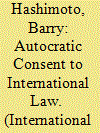

|
|
|
|
|
| Summary/Abstract |
This article contributes to an understanding of why autocrats have accepted the jurisdiction of the International Criminal Court. Leveraging their ability to obstruct their own prosecution, autocrats have traded off the risk of unwanted prosecutions against the deterrent threat that prosecutions pose to political rivals and patrons of their enemies conspiring to oust them. The risk of unwanted prosecutions and the court's deterrent threat both arise because ICC prosecutions credibly communicate guilt for international crimes to capital-disbursing democracies, which may, insofar as possible, use leader-specific economic statecraft to prevent the administration of foreign states by those whom the court signals are guilty of international crimes. Analysis using fixed effects and matching shows that a greater reliance on capital publicly financed by democracies increased the probability that a state accepted the court's jurisdiction only when it was an autocracy (1998–2017). ICC jurisdiction also lengthened the tenure of autocrats and reduced the severity of civil conflict in autocracies.
|
|
|
|
|
|
|
|
|
|
|
|
|
|
|
|
| 5 |
ID:
113823
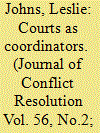

|
|
|
|
|
| Publication |
2012.
|
| Summary/Abstract |
Why do states build international courts, submit cases, and enforce court judgments? This article examines the role of a court that is neither a "decider" nor an "information provider." Litigation is costly and does not reveal private information. The court's ruling is not binding and bargaining can occur before and after the court has ruled. Nevertheless, an alternative dispute resolution mechanism emerges: court rulings can coordinate endogenous multilateral enforcement. Disinterested states will enforce to ensure that they can profitably use the court in the future. Accepting jurisdiction of the court allows a state to make efficiency-enhancing "trades," winning high-value disputes in exchange for losing low-value disputes. This is possible because litigation is a screening device: states only sue when they derive relatively high value from the disputed asset. The use of the court as a coordination device for multilateral enforcement allows for the existence of a court with endogenous enforcement and jurisdiction.
|
|
|
|
|
|
|
|
|
|
|
|
|
|
|
|
| 6 |
ID:
166144


|
|
|
|
|
| Summary/Abstract |
Little attention has been given to understanding how international courts feature in legitimacy assessments. How should the performance of international courts be evaluated in terms of their effect on a democratic deficit in international lawmaking? This article takes an initial step toward understanding how international courts improve or weaken the presence of democratic values in international lawmaking. In particular, this article focuses on one aspect of international courts—access for transnational actors. This article argues that TNA access to international courts provides an institutional mechanism to advance participation and transparency in international lawmaking. Normative and empirical analysis are combined to illustrate the extent to which access applies to international courts. Based on the empirical findings, which show a marked increase in TNA access to international courts, I argue that the increased participation and transparency made available through TNA access have democratizing effects on international lawmaking.
|
|
|
|
|
|
|
|
|
|
|
|
|
|
|
|
| 7 |
ID:
159208
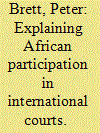

|
|
|
|
|
| Summary/Abstract |
Africa has more international courts than any other continent, yet International Relations scholarship has failed to explain this move to law on the African continent. This article provides such an explanation using Jean-François Bayart’s concept of extraversion. It shows how the creation of international courts in the 1990s and early 2000s was the result of extraverted strategies for attracting international resources and pre-empting donor pressures for political and legal reforms. By adopting these strategies, African states failed to behave in the ‘strategic’ manner anticipated by both constructivist and liberal institutionalist International Relations theories. International court creation did not reflect the pursuit of national interests or a response to normative NGO pressures. Making this argument, the article analyses the design and ratification of two new international courts: the SADC Tribunal and International Criminal Court. Using the case studies of Zimbabwe and Kenya, it shows how global scripts were repeated by even those states which have, in recent years, most vocally asserted their national interests against these courts.
|
|
|
|
|
|
|
|
|
|
|
|
|
|
|
|
| 8 |
ID:
036829
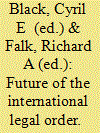

|
|
|
|
|
| Publication |
Princeton, Princeton University Press, 1971.
|
| Description |
v. 3; xiv, 413p.
|
| Standard Number |
0691092206
|
|
|
|
|
|
|
|
|
|
|
|
Copies: C:1/I:0,R:0,Q:0
Circulation
| Accession# | Call# | Current Location | Status | Policy | Location |
| 011065 | 341/BLA 011065 | Main | On Shelf | General | |
|
|
|
|
| 9 |
ID:
102024
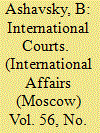

|
|
|
|
|
| Publication |
2010.
|
| Summary/Abstract |
RUSSIA'S POSITION with regard to international justice in general and international courts in particular is important both for diplomatic practice and theory. It is essential to understand the prospects of just decisions being made by international courts on cases to which Russia is a party or in which it has a special interest. Topical issues of international justice became a subject of discussion at a roundtable meeting hosted by the Center of International Law and International Security at the Institute for Contemporary International Studies (ICIS), Diplomatic Academy, Ministry of Foreign Affairs of the Russian Federation.
|
|
|
|
|
|
|
|
|
|
|
|
|
|
|
|
| 10 |
ID:
151652
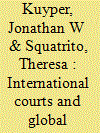

|
|
|
|
|
| Summary/Abstract |
In a post-Cold War era characterised by globalisation and deep interdependence, the actions of national governments increasingly have an effect beyond their own territorial borders. Moreover, key agents of global governance – international organisations and their bureaucracies, non-state actors and private agents – exercise pervasive forms of authority. Due to these shifts, it is widely noted that world politics suffers from a democratic deficit. This article contributes to work on global democracy by looking at the role of international courts. Building upon an original dataset covering the 24 international courts in existence since the end of the Second World War, we argue that international courts are able to advance democratic values and shape democratic practices beyond the state. They can do so by fostering equal participation, accountability, and public justification that link individuals directly with sites of transnational authority. We contend that the ability of international courts to promote these values is conditioned by institutional design choices concerning access rules, review powers, and provisions regarding judicial reason-giving. We canvass these design features of different international courts and assess the promises and pitfalls for global democratisation. We conclude by linking our analysis of international courts and global democratisation with debates about the legitimation and politicisation of global governance at large.
|
|
|
|
|
|
|
|
|
|
|
|
|
|
|
|
| 11 |
ID:
131486
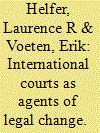

|
|
|
|
|
| Publication |
2014.
|
| Summary/Abstract |
Do international court judgments influence the behavior of actors other than the parties to a dispute? Are international courts agents of policy change or do their judgments merely reflect evolving social and political trends? We develop a theory that specifies the conditions under which international courts can use their interpretive discretion to have system-wide effects. We examine the theory in the context of European Court of Human Rights (ECtHR) rulings on lesbian, gay, bisexual, and transgender (LGBT) issues by creating a new data set that matches these rulings with laws in all Council of Europe (CoE) member states. We also collect data on LGBT policies unaffected by ECtHR judgments to control for the confounding effect of evolving trends in national policies. We find that ECtHR judgments against one country substantially increase the probability of national-level policy change across Europe. The marginal effects of the judgments are especially high where public acceptance of sexual minorities is low, but where national courts can rely on ECtHR precedents to invalidate domestic laws or where the government in power is not ideologically opposed to LGBT equality. We conclude by exploring the implications of our findings for other international courts.
|
|
|
|
|
|
|
|
|
|
|
|
|
|
|
|
| 12 |
ID:
036827
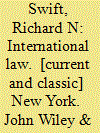

|
|
|
|
|
| Publication |
New York, John Wiley & Sons, Inc., 1969.
|
| Description |
xxiii, 558p.
|
|
|
|
|
|
|
|
|
|
|
|
Copies: C:1/I:0,R:0,Q:0
Circulation
| Accession# | Call# | Current Location | Status | Policy | Location |
| 002303 | 341/SWI 002303 | Main | On Shelf | General | |
|
|
|
|
| 13 |
ID:
121798
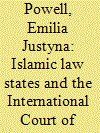

|
|
|
|
|
| Publication |
2013.
|
| Summary/Abstract |
The International Court of Justice (ICJ), as the principal judicial organ of the UN, plays an important role in peaceful resolution of international disputes. Traditionally, relations between Islamic law states, international law, and courts have been relatively tense due to the inherent link between Islamic law and the Islamic faith. Yet, several Islamic law states recognize the ICJ's compulsory and compromissory jurisdiction. This article asks: Why do some Islamic law states extend support to the International Court of Justice, while others turn away from the Court? I argue and empirically demonstrate that specific characteristic of Islamic law can explain variation of Islamic law states' preferences towards the ICJ. After providing original data on the characteristics of Islamic legal structures, I systematically compare pertinent rules of international law and Islamic law, focusing on similarities and differences between the two. Islamic law features such as respect for legal scholarship and peaceful resolution of disputes are compatible with principles embraced by the ICJ. Islamic law states that incorporate these norms are supportive of the Court. In contrast, Islamic law states that directly adopt sharia as the law of the land and incorporate sharia in their education systems are less open to the ICJ's adjudication.
|
|
|
|
|
|
|
|
|
|
|
|
|
|
|
|
| 14 |
ID:
133146
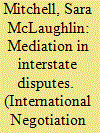

|
|
|
|
|
| Publication |
2014.
|
| Summary/Abstract |
This commentary provides a brief summary of the articles in this special issue and emphasizes four questions raised by this research: 1) ways to define and measure mediators' strategies, 2) teasing out demand side factors from supply side factors in mediation, 3) capturing differences between states and international organizations as conflict managers, and 4) understanding the role of particular conflict management actors like the International Criminal Court.
|
|
|
|
|
|
|
|
|
|
|
|
|
|
|
|
| 15 |
ID:
099871
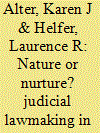

|
|
|
|
|
| Publication |
2010.
|
| Summary/Abstract |
Are international courts power-seeking by nature, expanding the reach and scope of international rules and the courts' authority where permissive conditions allow? Or, does expansionist lawmaking require special nurturing? We investigate the relative influences of nature versus nurture by comparing expansionist lawmaking in the European Court of Justice (ECJ) and the Andean Tribunal of Justice (ATJ), the ECJ's jurisdictional cousin and the third most active international court. We argue that international judges are more likely to become expansionist lawmakers where they are supported by substate interlocutors and compliance constituencies, including government officials, advocacy networks, national judges, and administrative agencies. This comparison of two structurally identical international courts calls into question prevailing explanations of ECJ lawmaking, and it suggests that prevailing scholarship puts too much emphasis on the self-interested power-seeking of judges, the importance of institutional design features, and the preferences of governments to explain lawmaking by international courts.
|
|
|
|
|
|
|
|
|
|
|
|
|
|
|
|
| 16 |
ID:
172884
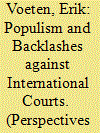

|
|
|
|
|
| Summary/Abstract |
International courts, like domestic courts, protect liberal limits on majoritarianism. This sometimes puts these courts in a position to protect the property rights of the “corrupt elites” that are targeted by populists or the civil liberties of those who are targeted in domestic populist identity politics. Moreover, populism offers an ideology to attack the authority of a court rather than just its individual rulings. An empirical examination illustrates the plausibility of this argument. A large number of backlashes against international courts arise from judgments that reinforce local populist mobilization narratives. Populist backlashes against international courts are not just about sovereignty but often follow efforts to curb domestic courts, usually for similar reasons. Yet populist backlashes do not always succeed, either because populist leaders do not follow up on their exit threats or because populism is too thin an ideology for creating successful multilateral reform coalitions.
|
|
|
|
|
|
|
|
|
|
|
|
|
|
|
|
| 17 |
ID:
158329
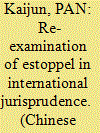

|
|
|
|
|
| Summary/Abstract |
Estoppel is a principle of international law recognized by the International Court of Justice, the International Tribunal for the Law of the Sea and other courts and tribunals. And international courts and tribunals are generally consistent in setting out the requirements for invoking this principle. Nevertheless, international lawyers still doubt “its incidence and effects” and sometimes get confused with its relationship with other concepts. This article further clarifies the requirements of estoppel based on past jurisprudence. On this basis it argues that acquiescence can be regarded as a special form of estoppel. Estoppel and tacit agreement, unilateral declarations and bilateral custom are similar legal regimes but they should be distinguished from each other to avoid fragmentation. Estoppel properly defined can contribute to mutual trust and stability in the international community.
|
|
|
|
|
|
|
|
|
|
|
|
|
|
|
|
| 18 |
ID:
152990
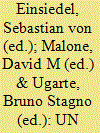

|
|
|
|
|
| Publication |
New Delhi, Viva Books, 2017.
|
| Description |
xv, 999p.hbk
|
| Standard Number |
9789386385277
|
|
|
|
|
|
|
|
|
|
|
|
Copies: C:1/I:0,R:0,Q:0
Circulation
| Accession# | Call# | Current Location | Status | Policy | Location |
| 059072 | 341.23/EIN 059072 | Main | On Shelf | General | |
|
|
|
|
|
|
|
|
|